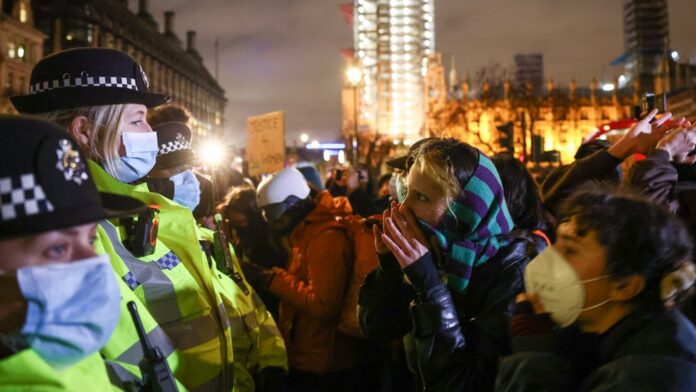The Government’s Police, Crime, Sentencing and Courts Bill (Part 3) would curb non-violent protest in a way that is inconsistent with our human rights and is deeply concerning, says the Joint Committee on Human Rights.
The Committee has serious concerns about the proposed legislation and calls for the complete removal of some clauses saying that a new noise ‘trigger’ for conditions on protests is neither necessary nor proportionate and should be deleted from the Bill.
New powers to impose conditions on one-person protests in England Wales should be dropped and that on sentencing, clauses that increase penalties for breaching conditions placed on protests should be removed as the case has not been made for them.
The Committee’s report counters Government’s proposed powers by recommending the introduction of express statutory protection for the right to protest, setting out the obligation on public authorities to refrain from interfering unlawfully with the right but also the duty to facilitate protest.
Our rights to freedom of expression (Article 10) and freedom of association (Article 11) are guaranteed by the Human Rights Act 1998 which incorporates the European Convention on Human Rights (ECHR). Any interference with non-violent protest risks undermining these Convention rights.
A new trigger for imposing conditions based on noise strikes at the very heart of why people gather together to protest – to have their voices heard. Demonstrations with the greatest public backing could be disproportionately impacted by this expansion of police powers to move the location of a demonstration, limit its numbers, duration or even silence chants. The report points out that the law already provides a range of powers to deal with noise and urges Government to remove the new trigger for imposing conditions on processions and assemblies from the Bill.
While some changes to the offence of failing to comply with police conditions may be justified, the Bill goes further than is necessary, making the criminalisation of peaceful protesters more likely. The report proposes more limited changes.
The creation in Clause 59 of a new statutory offence of “intentionally or recklessly causing public nuisance” is broadly drafted and risks criminalising some forms of peaceful protest, leading to fines or custodial sentences. The offence needs to be amended to make clear that courts must take the right of peaceful protest into account when considering whether a crime has been committed. As a matter of practice, the Committee believes police should use more specific charges before resorting to the catch-all nature of Clause 59.
Too much of Part 3 of the Government’s PCSC Bill leaves room for confusion and the potential for arbitrary or discriminatory use of new powers, says the Committee. Using multiple terms that are open to wide interpretation leaves the law unclear for police and protestor. However, the Secretary of State’s intention to clarify the meaning of the term ‘serious disruption’ must be explained before scrutiny of the Bill has concluded, as this will directly impact on the use of police powers against protesters. The drafting of the public nuisance offence requires amending to make clear it is committed only where serious harm is caused to the public or a section of the public.
The Chair of the Joint Committee, Harriet Harman MP said:
“One of our most fundamental rights is to protest. It is the essence of our democracy. To do that, we need to make ourselves heard. The Government proposals to allow police to restrict “noisy” protests are oppressive and wrong.
“The Government put forward new powers in area areas where the police already have access to powers and offences which are perfectly adequate. The Government has served up confusion where clarity and precision is essential.
“Noisy protests are the exercises of the lungs of a healthy democracy. They should not be treated as an inconvenience by those in power. We are calling for the right to protest peacefully to be given explicit statutory protection.”







